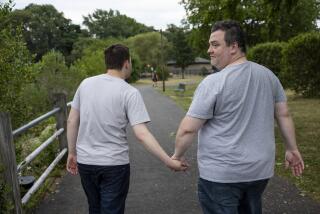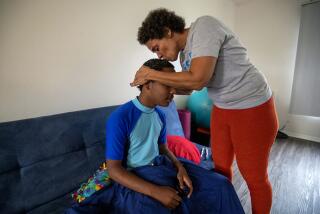Boy Needs a Doctor, but None Answer Mother’s Pleas
- Share via
There’s a 14-year-old boy in Irvine who, if he could, would ask why no doctor will treat him.
He’d ask why, two months after his teacher raised the possibility that he had been sexually molested, he hasn’t been examined.
He’d ask why--with no one able to say for sure that he hasn’t been infected with a sexually transmitted disease or injured in some way--his mother has had to make dozens of phone calls and spent two futile months trying to make an appointment for him.
She needs a doctor for her autistic son. What she has gotten has been a maddening merry-go-round of excuses.
Orange County doctors have cited jurisdictional problems--the suspected incident, if it occurred, took place in Santa Barbara, where the boy was a resident at a 24-hour-care facility. Santa Barbara authorities wouldn’t examine him because they couldn’t verify the assault.
Other physicians have said they don’t have the expertise in sexual assault cases. Still other doctors have said they weren’t experienced in handling autistic patients. Some have cited insurance-payment problems, although the woman says she told them she’d pay cash.
Her family doctor, who said he wasn’t trained to do the procedure, gave her three referrals but was shocked weeks later to find out none had taken the case.
“I don’t give up easily,” the boy’s mother said last week.
Although the 41-year-old mother was willing to be identified, I’ve chosen not to because of the sensitivity of the subject matter.
Her teen-age son has regressed to bed-wetting. He insists on taking baths every few hours. He repeatedly points to his bottom and complains of an ow-ee.
I asked Santa Barbara authorities why they didn’t authorize a medical exam in May when the boy was brought in. Sheriff’s Department spokeswoman Lt. Deborah Linden says investigators couldn’t verify an assault had occurred. “It raised a whole host of possibilities,” Linden said of the investigation. “One of which was that everything was fine, there was no assault, no molestation. . . . The other is that, yeah, something happened and we just don’t know, and there was no way to substantiate it.”
I asked if she could assure anyone that an assault hadn’t occurred.
“We won’t make the statement that an assault didn’t occur,” she said. “The strongest statement we can make is we don’t know. . . .”
The original report from his teacher, she said, was that the boy exposed himself, not that he had been molested. That’s true, up to a point. The teacher did, indeed, specify an exposing incident but told me last week she made it clear to authorities the incident raised a red flag in her mind about possible molestation.
Psychologist Anna Kokotovic conducted a 90-minute interview with the boy as part of the Santa Barbara investigation. The boy has “great communication problems,” she told me, noting that she “didn’t get sufficient information from the interview or the other parts of the investigation to determine what, if any, abuse happened.”
Why not let a doctor see him, just to make sure? I asked.
That’s a law-enforcement decision, she said.
She wouldn’t second-guess them, but added: “As a field, we need to do a much better job [with cases like this]. These are very difficult cases. They also are special-needs children, frequently abused, easy targets for predators.”
The Irvine woman, who is a single parent also raising a 12-year-old son, brought her autistic son back to Orange County, intent on finding a doctor to determine if he had sustained any damage.
That’s when the carousel of calls began.
“I’d call an emergency room,” she told me, “and talk to a nurse, trying to track down a doctor. She suggested I not mention sexual assault [because it would hurt her chances of the doctor taking the case]. I called the same facility the next day and got a different nurse who said if I didn’t mention sexual assault, and they found any kind of evidence of an assault, then they’d detain me and call the police and that I’d most likely be arrested.”
Many of the woman’s referrals led her to doctors linked to the Orange County’s Child Abuse Services Team (CAST), which generally examines children for evidence-collecting purposes. But it only sees patients who have been referred from law enforcement or Social Services officials. As a result, those all became dead-ends.
Jeanie Ming, a nurse practitioner for CAST, said family-practice physicians should have been able to handle the boy’s examination. Ming speculated that they might have been put off by the specter of getting involved in a criminal case.
The boy’s mother has heard it all. “I guess I see their point, but my bottom line remains the same. My son . . . needs medical care. And that’s all I care about. I don’t care about doctors’ problems, or their reasons. I care about my son.”
The sad-eyed cynic in me says this boy has been failed by a system that saw him first as a bad courtroom witness, then as a potential time-consuming legal albatross and, possibly, as a load to handle in an examination room.
Each doctor probably figured the mother’s next phone call would pay off.
“It’s a perfect example of the lack of compassion for our disabled people and the ignorance people have for what parents of disabled people go through,” the mother said. “I’ve dealt with it since he was born. I’m so used to bureaucratic fights, but I never thought I’d get one on this. I never thought medical attention would have been a problem.”
Which leaves her wondering the same thing she was wondering on May 21 when her son’s teacher first suspected molestation:
“I just want to know,” his mother said.
It doesn’t sound like too much to ask.
Dana Parsons’ column appears Wednesday, Friday and Sunday. Readers may reach Parsons by calling (714) 966-7821, by writing to him at The Times Orange County Edition, 1375 Sunflower Ave., Costa Mesa, CA 92626, or by e-mail at dana.parsons@latimes.com.
More to Read
Sign up for Essential California
The most important California stories and recommendations in your inbox every morning.
You may occasionally receive promotional content from the Los Angeles Times.










